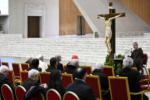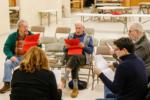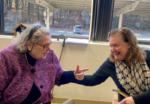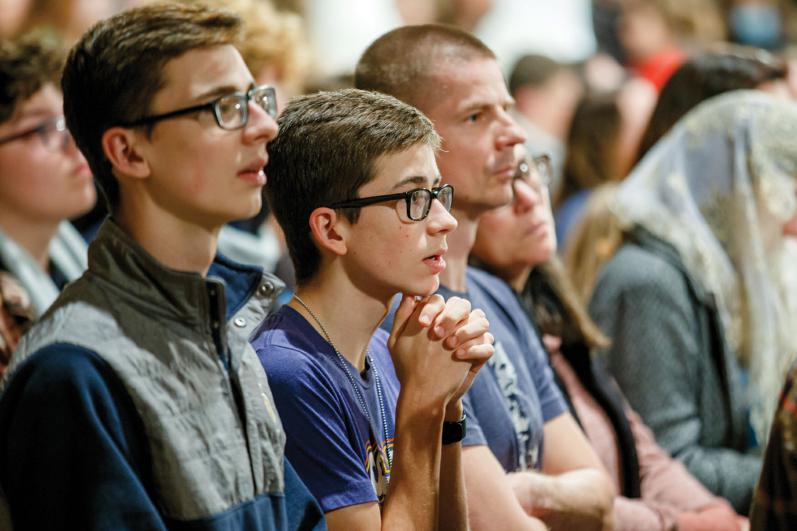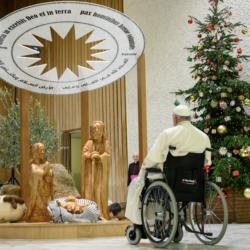Pro-life thought leaders explore how to change hearts and minds post-Roe
WASHINGTON (OSV News) -- The pro-life movement should work to change hearts and minds on the issue of abortion by demonstrating "radical solidarity" with women and unborn children, some of the movement's thought leaders said at a Jan. 19 panel in the nation's capital.
Experts on the panel, sponsored by the University of Notre Dame's de Nicola Center for Ethics and Culture and held on the eve of the national March for Life, said that in order for the movement to be successful, it has to demonstrate the inherent dignity of every person, including the poor and vulnerable.
"We'll have an exchange and extend the hand of love and friendship to those who disagree very deeply with us on this question, to our pro-choice friends and neighbors," O. Carter Snead, director of the de Nicola Center and a professor of both law and political science at Notre Dame, told attendees gathered at the National Press Club in Washington. "What this movement is about is unconditional love; it's about 'everybody counts.' It's about radical hospitality, radical solidarity. You don't change hearts and minds with arguments -- you change hearts and minds by loving people."
The event was part of the de Nicola Center's "Women and Children First Initiative," exploring the legal, public policy, and cultural elements surrounding building a life-affirming culture across issues such as health care, poverty, racial justice and human rights.
Demonstrating radical solidarity with women facing both planned and unplanned pregnancies is crucial to building a culture of life, panelists said. But they all pointed beyond public policy to everyday interactions with loved ones or medical professionals as key moments of influence.
Mary Hallan FioRito, the Cardinal Francis George Fellow at the Ethics and Public Policy Center in Washington, as well as the de Nicola Center, shared a story about how one of her friends from college and her friend's future husband told their parents of their unexpected pregnancy prior to getting married. Her friend's mother, she said, went to the kitchen and got champagne to toast the new addition to the family. However, his parents had a "horrible reaction."
A willingness to accompany women in pregnancy, FioRito said, is crucial.
"That first reaction can be significant," FioRito said, when a woman is deciding whether or not to go through with a pregnancy.
Former congressman Dan Lipinski, a Catholic Democrat from Illinois who lost his U.S. House seat after a primary challenge from a pro-abortion rival in 2020, said that while the movement sought an end to Roe v. Wade, its reversal has made aspects of the cause "a lot harder now" on a political level.
"The other side was ready," he said. "I don't think we were ready."
After ballot successes for Democrats on abortion, Lipinski said, the party will be energized to seek comparable victories at the state level.
"'Safe, legal, and rare' -- well, rare's gone," Lipkinski said of the Democratic Party's shift on abortion, referencing a line coined by former President Bill Clinton in his 1992 presidential campaign to describe the party's position on the issue.
While urging pro-life Republicans to adopt more social safety net measures, Lipinski praised the Providing for Life Act, a bill introduced by Sen. Marco Rubio, R-Fla., which includes a compilation of efforts including an expanded child tax credit.
The panel took place the day before the 50th annual March for Life in Washington.
- - - Kate Scanlon is a national reporter for OSV News covering Washington.- - - BRIEF: WASHINGTON (OSV News) -- The pro-life movement should work to change hearts and minds on the issue of abortion by demonstrating "radical solidarity" with women and unborn children, some of the movement's thought leaders said at a Jan. 19 panel held at the National Press Club in Washington. Experts on the panel, sponsored by the University of Notre Dame's de Nicola Center for Ethics and Culture, said that in order for the movement to be successful, it has to demonstrate the inherent dignity of every person, including the poor and vulnerable. The event was part of the de Nicola Center's "Women and Children First Initiative," exploring the legal, public policy, and cultural elements surrounding building a life-affirming culture across issues such as health care, poverty, racial justice and human rights.

